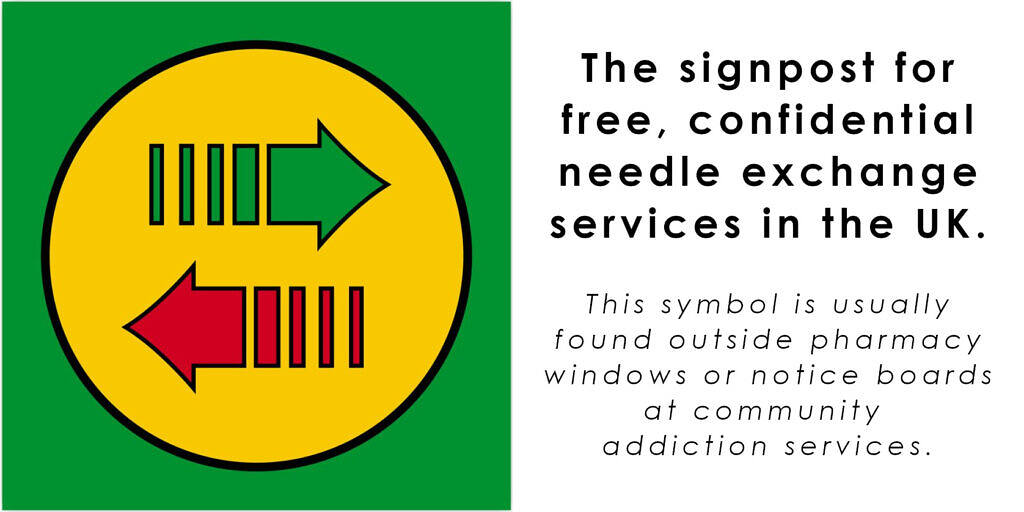Paying a visit to a needle and syringe service is available to any individual who engages in drug injection in the United Kingdom.
Needle exchanges are free services that provide new sterile injecting equipment to safeguard oneself against the following:
- Infections
- Injuries
- Abscesses
Where to find a needle and syringe service
Needle and syringe services are usually found in:
- Drug and alcohol services
- Pharmacies or chemists
Find local needle exchange services:
Scotland: www.needleexchange.scot
England: www.wearewithyou.org.uk
Northern Ireland: www.publichealth.hscni.net
You can get new equipment wherever you see this sign:

Visiting a needle exchange unit
Needle exchange services:
- Are free
- Do not require an appointment
- Do not require you to hand in used equipment to get new equipment
When you visit a needle and syringe service, you will talk to a trained staff member in a private room.
You will be asked:
- Your name (if preferred, you can provide your initials instead)
- Date of birth
- The equipment you require
- To return the used equipment you have in the sharps bins provided
Needle exchange staff encourage everyone to return used equipment so they can dispose of it safely.
Available equipment
You can get new equipment free, whatever drug you are injecting; this includes steroids.
Letting the staff know what drug you’re using will ensure you get the right equipment. Also, letting them know about how much you need will ensure you get enough equipment.
You can receive:
- needles (pins)
- syringes (barrels)
- spoons (cookers)
- citric or vitamin C
- filters
- foil
- Sharp bins
Confidentiality
Needle and syringe services will not tell anyone you’ve visited; anything you say to the staff is confidential.
Staff will only share your information with someone else if they are concerned about your safety or someone else’s.
Advice
The staff at needle and syringe programs possess extensive knowledge in the practice of safe injection. Feel free to consult them regarding wound care, infection prevention, or any other inquiries related to injecting substances.
Staff can help you find other support, including drug or alcohol treatment and advice on sexual health, housing and legal matters.
Prescriptions or ‘Scripts’
If you are currently using an opiate substance such as heroin, you have the option to consult with the staff regarding obtaining a prescription for methadone or buprenorphine. This will assist you in either undergoing detoxification or managing your addiction.
Testing
You can get tested for infections that spread through the blood, such as HIV, Hepatitis B and Hepatitis C.
These viruses are easily spread by sharing needles, syringes and other equipment used to prepare or take drugs. These include:
- spoons
- filters
- pipes
- straws
Vaccines
As an injecting drug user (IDUs), you are more susceptible to contracting the hepatitis B virus.
- High-risk IDUs are at high risk of infection and transmission of HBV, with at least 20% of infections occurring in this group.
- HBV can lead to lifelong infection, and chronic HBV can cause progressive liver disease and fatal complications like cirrhosis and liver cancer.
You can get free vaccination against Hepatitis B at most needle exchanges, sexual health clinics or GP surgeries. The Hepatitis B vaccination is recommended for people who inject drugs or live with someone who injects drugs.
Naloxone
The staff at the needle and syringe service can provide guidance on how to prevent overdoses.
They can give you a free injection (Prenoxad) or nasal spray (Nyxoid) of naloxone to counteract the impacts of opioid substances such as heroin, morphine, and methadone.
They will also teach you how to utilize these tools effectively.
The importance of syringe exchange services
Needle exchange programs engage users, reducing harm and improving health. They will also significantly benefit the wider community through reduced costs and improved public safety and amenity.
The risk of bloodborne viruses, overdose and drug-related death, and other injecting-related complications,
such as abscesses, wounds, and deep vein thrombosis, is apparent. Needle exchange services can educate IDUs on safer injection practices to help prevent these health concerns.
The best way to use your local needle exchange program is to be prepared before taking drugs by doing the following:
- Locating your closest syringe exchange service
- Seek advice on how to inject safely
- Take your sharps bin to be disposed of safely
- Talk to a team member about treatment and recovery

